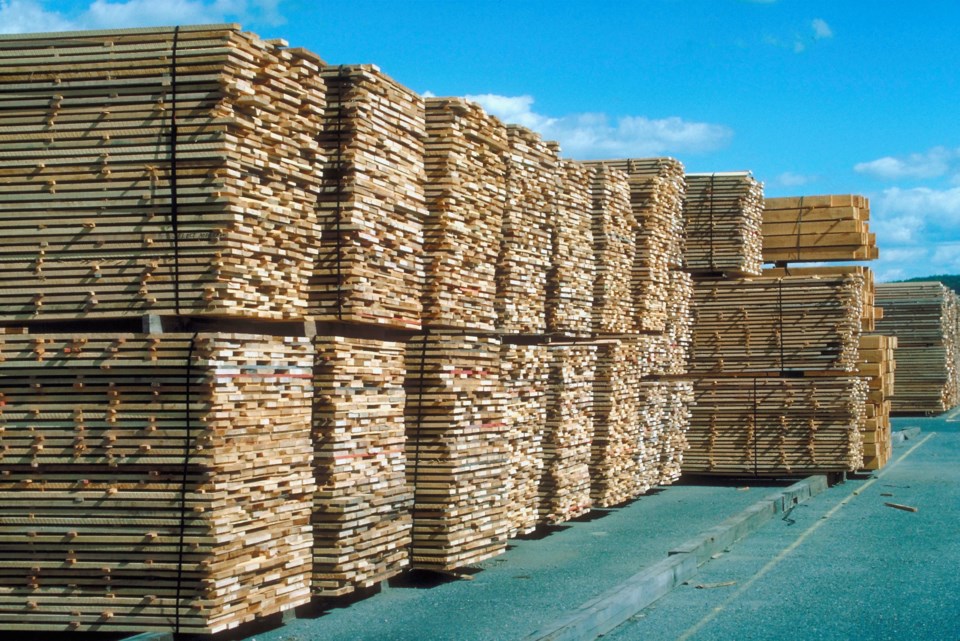News the U.S. government plans to reduce duties on Canadian softwood lumber is good for B.C. lumber producers, according to the president of a forest industry group, but it's won't solve all of the sector's woes.
On Feb. 3, the U.S. Department of Commerce announced the preliminary results of its first administrative review of the anti-dumping and countervailing duties on Canadian lumber. If the proposed preliminary rates are adopted, B.C. lumber producers could see duties cut more than in half in August.
"Obviously we're pleased with the preliminary findings," B.C. Council of Forest Industries (COFI) president Susan Yurkovich said. "I should note... it doesn't change the deposits we're paying right now."
Canada's legal team and COFI's lawyers are reviewing the preliminary decision, in what has been an ongoing and complex trade dispute between Canada and the U.S., she said.
Canada and COFI's stance has always been that the duties are unfair and unjustified, that Canada doesn't unfairly subsidize its forest sector, Yurkovich said. It's a position which has been upheld repeatedly by the World Trade Organization and NAFTA panels.
Since Dec. 28, 2017 Canadian producers have been paying 20.23 per cent at the U.S. border, with three major B.C.-based producers – Canfor, Tolko and West Fraser – facing even higher duties.
The U.S. Department of Commerce's proposed cash deposit rate would drop to 8.21 per cent. Canfor would see its deposit rate drop from 20.52 per cent down to 4.63 per cent; West Fraser's deposit rate would drop from 23.56 per cent to 9.08 per cent; and Tolko's rate would drop from 22.07 per cent to 8.21 per cent.
The U.S. Department of Commerce launched a second review on Jan. 2 this year, which could make different recommendations and change the industry landscape again, Yurkovich said.
"Its taking a lot resources from the Canadian industry – financial resources and human resources which would be better used growing the forest sector in Canada and the U.S." she said.
But even if the duties were eliminated tomorrow, it wouldn't solve all the issues facing B.C.'s forest sector, Yurkovich said.
"We're a high-cost jurisdiction," she said. "Secure access to (wood) fibre at a reasonable cost is the single most-important factor in keeping mills operating."
B.C. Forests Minister Doug Donaldson said the development is a sign the governing NDP's strategy of leaving the system for calculating stumpage alone is the right one.
"We've have had B.C. Liberals suggesting we should get involved in the stumpage rates directly and of course that would be seen as a political intervention and make matters worse," Donaldson said.
During a visit to Prince George last week, B.C. Liberal leader Andrew Wilkinson called on the NDP to calculate stumpage on a month-to-month basis as is done in Alberta and "seems to satisfy the U.S. Department of Commerce."
Stumpage in the B.C. Interior has declined 16 per cent since July 1, Donaldson noted on Tuesday, "so we're convinced our stumpage system reflecting log prices is robust."
He said a "what-we-heard" document on the engagement process for forest-dependent communities in the Interior will be out in the coming weeks.
"But we've seen, in a preliminary sense, people wanting action on more fibre being brought out of the forests for sure and that's something that we know people in the north are concerned about when they see slash piles being burned and we seen pellet plants needing wood and we see secondary manufacturers that have good use for that wood," Donaldson said.
A spokesperson for Canfor declined to comment on the decision, however investors responded quickly to the news.
In early trading in Toronto on Tuesday, Canfor stock rose as much as 7.5 per cent, West Fraser Timber jumped by 6.2 per cent and Resolute Forest Products Inc. was up three per cent.
On Monday, CIBC analyst Hamir Patel quoted "trade contacts" in a report that suggested average U.S. duties would drop from about US$67 per thousand board feet to about US$30 based on current pricing levels of about US$400.
The report says it's not expected that Canadian companies will receive any refund or credit for overpayment until the trade dispute is resolved, something not expected for two to three years.
"According to trade contacts, preliminary revised duty determinations from the U.S. government have been communicated to the Canadian industry," Patel said. "We expect Canadian lumber equities to respond positively to this news as these rate revisions were better than most Canadian industry participants were expecting."
This is the fifth time Canada and the U.S. have fought over the same issues.
In September, a joint Canada-U.S. trade panel gave the United States 90 days to rethink its tariffs, finding there was no evidence Canadian imports were causing injury to the U.S. industry.
— With files from The Canadian Press



